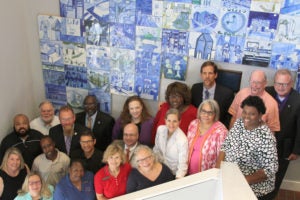“I see my role as being a facilitator of the work—to go in and build relationships with the lead organizations, as well as the community,” Sherrye Willis says.
 The grantees of the Hogg Foundation’s most recent initiative, Collaborative Approaches to Well-Being in Rural Communities (WRC), have set out to transform mental health in five Texas counties: Bastrop, Brooks, Morris, Nacogdoches and Victoria.
The grantees of the Hogg Foundation’s most recent initiative, Collaborative Approaches to Well-Being in Rural Communities (WRC), have set out to transform mental health in five Texas counties: Bastrop, Brooks, Morris, Nacogdoches and Victoria.
Sherrye Willis, founder and CEO of Alliance for Greater Works, was selected by the foundation to coordinate the initiative. On this week’s episode of the foundation’s podcast, Into the Fold, Willis breaks down the ways in which her team will be working with grantees to harness resources, develop leadership skills, and build stronger relationships in community.
Coordinating Resources by Connecting People
Willis grew up in a low-income, rural community. That upbringing, combined with more than 30 years of work in the nonprofit sector, inspired the founding of an organization that would facilitate collaborative partnerships to promote community equity—and thus, in 2001, Alliance for Greater Works was born.
“I’ve always had a heart for working in community,” Willis says. “Not just at an administrative level, but truly getting amongst the people.” By offering training and consulting services that help community organizations establish collective impact processes, Alliance for Greater Works brings “the people” to the negotiating table—making decision-making structures more inclusive and in touch with the realities of the setting.
Conducting community-based participatory research is another way for coordinators to get community members—especially historically excluded members—more involved in a given initiative. Rather than serve as a passive object of study, they’re enlisted to play an active role in determining recommendations for action. In doing so, people better understand how they can contribute to the project and are invested in seeing it through to fruition.
Cultural Humility: Getting to the Heart of Community and the Root of its Challenges
Because the rural communities served by WRC grantees are remarkably diverse—as will be the strategies they implement to improve well-being—Willis thinks those who administer training, technical assistance and evaluation procedures would do well to maintain a spirit of “cultural humility.”
In Willis’ view, that means not telling communities “what they need to do, but trying to understand better where they are.” It’s an exercise in empathy that’s not about data collection and demographics, but the social determinants that shape the human experience.
When Alliance for Greater Works coordinated the Hogg Foundation’s Faith-Based Initiative for African American Mental Health Education, Willis’ biggest takeaway had little to do with numbers. “What I learned, and continue to learn as I work in community, is that it’s first about relationship-building,” she says. “It’s about building community—sitting with someone and having the time to visit and talk and know what their heart is.”
Ultimately, systems change comes down to people. Whether it’s one-on-one or with collaborating groups, Willis’ humble and humanistic approach ensures that the right individuals are not just heard, but are on the front lines of transformative processes.
“We’re not just looking at programs and social services,” Willis says. “We’re actually going to the root causes of why these issues are occurring in community, and what we can do at the systems level to change the situation.”
Learn more about our podcast and check out other episodes!
RELATED CONTENT
Moving Upstream: How Funders Can Address Root Causes
Funders are most impactful when they listen to and learn alongside grantseekers and grantees.
Understanding Rural Communities
How the unique characteristics of rural communities affect mental health program implementation.